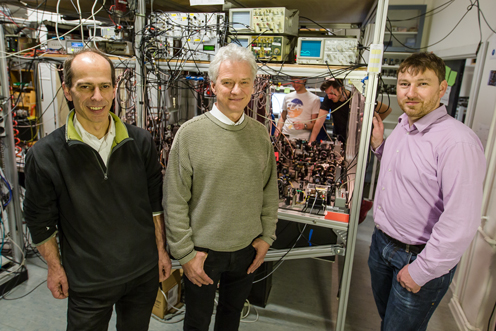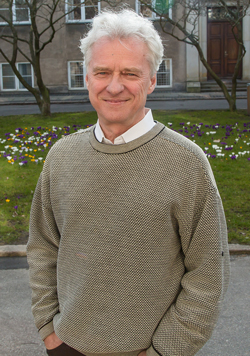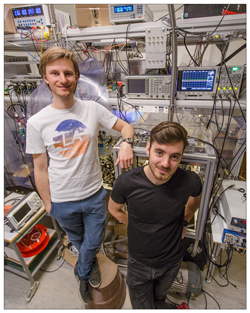Eugene Polzik receives ERC Advanced Grant for the second time, this time for 16.2 million DKK
Eugene Polzik, professor and head of the research group QUANTOP (Quantum Optics Laboratory) at the Niels Bohr Institute at the University of Copenhagen has been awarded an ERC Advanced Grant of 16.2 million DKK from the European Research Council (ERC). The ERC Advanced Grant was established ten years ago in 2008 and since then 50 of these special grants have been awarded to Danish researchers, six of them to researchers from the Niels Bohr Institute. Eugene Polzik is the first researcher from Denmark who has been awarded this grant twice (2012 and 2018).

Members of the QUANTOP group who will be part of the ERC project QUANTUM-N. From left: Associate Professor Jörg Helge Muller, Professor Eugene Polzik and Associate Professor Jürgen Appel. In the background are PhD students Christoffer Møller and Rodrigo Thomas.
The ERC Advanced Grant is the most prestigious European research grant awarded to outstanding researchers across the natural sciences, life sciences and humanities. Unlike many other national and international grants that are often awarded based on specific research guidelines, the ERC grant is based on a single criterion – research at the highest level.
From Saint Petersburg to California to Copenhagen – a Russian-born Danish-American
Eugene Polzik was born in 1953 in Saint Petersburg, Russia. He received his master’s degree in Physics from St. Petersburg University in 1976 and his PhD in 1980. He continued as an associate professor at the university until 1988 and then moved to the United States in 1989. He went to the California Institute of Technology - Caltech and became part of the research group that was one of the first in the world to carry out teleportation from light to light.

Professor Eugene Polzik started the first major Nordic research centre in modern quantum physics QUANTOP in 2001.
Denmark wanted to participate in this new cutting edge research and from 1994-98, Polzik worked both at Caltech and Aarhus University, until he moved to Denmark in 1998. He was appointed Professor of Atomic, Molecular and Optical Physics at Aarhus University in 1999 and in 2001 he won a grant from Danish National Research Foundation for a centre of excellence for quantum optics, QUANTOP at Aarhus University, the first major Nordic research centre in modern quantum physics. In 2003, he moved the centre to the Niels Bohr Institute at the University of Copenhagen, where the research group has since had many major scientific breakthroughs.
In 2006, he became a member of the Royal Danish Academy of Sciences and Letters. In 2007, he was named among Scientific American Top 50 researchers for his work on quantum teleportation. He has received many awards and in 2010 he was given the Gordon Moore Distinguished Scholar Award in recognition of his work within quantum information, quantum optics and quantum metrology. In 2014, his research was named the year’s best by Ingeniøren and in the same year he also received the Danish Association of Masters and PhDs’ Research Award.
Precision measurements at the atomic level
In the QUANTOP laboratories at the Niels Bohr Institute, they research various kinds of quantum phenomena and one of the most important areas of research is quantum precision measurement. A fundamental aspect of quantum mechanics is the balance between information and disturbance when measuring with advanced microscopes and other special measuring equipment, a problem that both Niels Bohr and Werner Heisenberg worked on in the 1920s. The inaccuracies which inevitably sneak into certain measurements at the quantum level described as the so-called ‘Heisenberg’s uncertainty principle’.

Ph.D students Christoffer Møller (left) and Rodrigo Thomas are both a part of the project at the QUANTOP laboratory.
The challenge is that observing an object with laser light will inevitably affect the object. This happens because the light is a stream of photons and when the light is reflected by the object, it causes the object to move in random directions. It is these random movements that set limits for how precisely we can measure at the quantum level.
Through a series of experiments in 2009-2017, Professor Eugene Polzik and his co-workers demonstrated that this principle in a sense could be neutralised if the light is first transmitted through a cloud of atoms. A discovery that, among other things, could directly impact the development of new measuring equipment, such as sensors that detect and measure all sorts of things. Examples include ultra-sensitive magnetic sensors used in health industry or sensors of motion used everywhere, from mobile phones to spaceships.
About the ERC project
Eugene Polzik’s ERC Advanced Grant has been awarded for the project “Quantum mechanics in the negative mass reference frame (Quantum-N)”. The research will be conducted by a group of dedicated quantum physicists and graduate students in the QUANTOP laboratories at the Niels Bohr Institute, where measurements of motion, acceleration and forces be carried on at an unprecedented level of precision.
The central part of the project deals with creating entangled states of a mechanical motion sensor and an atomic cloud. Entanglement is phenomenon found only in quantum mechanics. Nothing comparable exists in our traditional view of the world.
Entanglement means that the quantum properties of two objects, such as the mechanical sensor and the atomic cloud, are very strongly connected. The entangled state, which will be generated in the Quantum-N project, will allow for measurement of motion and force that goes beyond the ‘Heisenberg’s uncertainty principle’. One of the most ambitious goals of the project is to improve the sensitivity of the best motion detectors, namely the gravitation wave interferometers, which recently reported the first observation of gravitational waves (Nobel Prize in Physics, 2017).

Eugene Polzik, professor and head of Quantop Optics at the Niels Bohr Institute, University of Copenhagen, Tel.+45 23 38 20 45, Email: polzik@nbi.ku.dk
Topics
See also:
Contact
Eugene Polzik, professor and head of Quantop Optics at the Niels Bohr Institute, University of Copenhagen, Tel.+45 23 38 20 45, Email: polzik@nbi.dk
|
